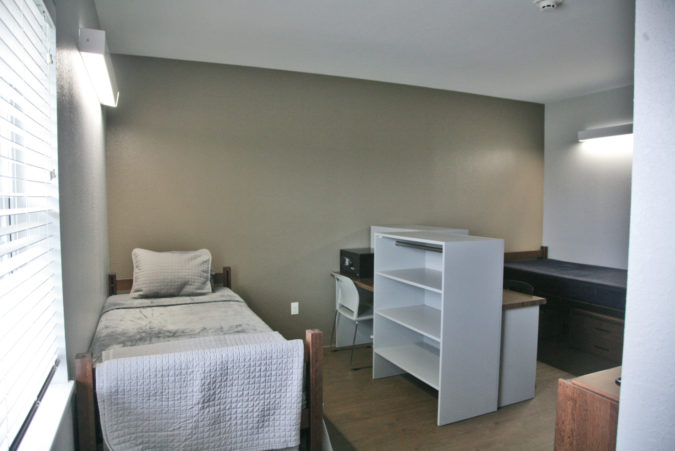Transitional Housing
One of the most important factors that contributes to prolonged sobriety is a safe and supportive living environment. Some patients are able to return to a home where drug or alcohol use are not an issue, but many have family or spouses who also struggle with substance abuse. Other patients have no home to return to and need sober housing options. For those who qualify, Transitions can provide extended recovery accommodations and assist in the expansion of essential life skills that promote autonomous sober living.
Transitions is a 64-bed, dorm-style community living center where patients who complete treatment at Crossing Recovery Center can continue to strengthen their recovery abilities and self-confidence. Each of the two floors contain female and male wings, a kitchen, and community area. Laundry facilities are available for residents to use as needed. Residents will have access to meals and snacks from the on-site “Central Avenue Grill.”
Those who reside in Transitions will be required to attend all groups and individual counseling sessions according to their treatment plan. In addition, Transitions residents will participate in activities that will improve their overall health and wellbeing- such as nutrition and fitness classes. Financial literacy and career readiness classes are required to ensure that barriers to self-sufficiency are addressed.
Residents will be assigned a “phase” according to their progress through treatment which determines their access to outside passes and visitors. Those on lower phases will be encouraged to avoid outside work, particularly full time, since it could conflict with their treatment requirements. While living in Transitions, residents will have opportunities to seek paid work internships on or off campus that provide the flexibility needed to attend all group and counseling appointments.
Every month, the residents of Transitions participate in a “Speaker” brunch to acknowledge their time in sobriety. In addition to a delicious communal meal, the residents will be inspired by hearing the story of a peer. Certificates of recognition for various accomplishments are awarded, and a celebratory “sobriety count-down” takes place. Transitions promotes togetherness and peer support so that everyone leaves with connections to a sober network.
Requirements for Admission to Transitions
*All applications for Transitions residency are reviewed by a committee made up of medical and behavioral health staff, Transitions staff, the Director of Adult Education and the Director of Nutrition and Wellness Services to ensure each resident will benefit from and contribute to the positive recovery community at Transitions.
- Successful completion of residential treatment at Crossing Recovery Center
- Displayed no inappropriate or negative behavior requiring behavioral agreement while in residential treatment
- Resident of Macon, Logan, Dewitt, Piatt, Mountrie, Shelby, or Christian counties
- Pass a background check with no class X or M felonies (including, but not limited to: murder, armed robbery, armed violence, home invasion). No charges of a sexual nature. Individuals with aggravated battery or aggravated assault charges will be reviewed on a case-by- case basis
- Agree to terms of housing agreement, which include mandatory individual and group counseling , nutrition coaching , gym attendance, education classes (financial literacy, career readiness) and community expectations.
- Agree to pay monthly fee according to sliding scale, based on poverty guidelines
- Agree to limited outside work in order to focus on recovery









